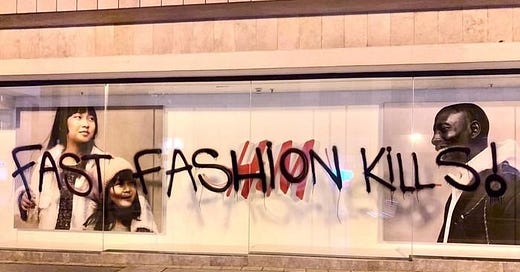"I can excuse racism, but animal cruelty is where I draw the line"
pseudo-Marxism, apathy, and consumption - no one should need to die for fashion.
Fast fashion supporters come in two varieties. The “there’s no such thing as ethical consumption under capitalism!” wannabe-Marxist recreants, and then the more nefarious “send my thanks to the kids in China!” kind. One leads with defensiveness, and the other plays on offense, and both of them are equally as condemnable. The dissipating disdain for fast fashion in light of an ever-growing animal cruelty consciousness raises the question; why do we offer more humanity to animals than people?
Crocodile skin Hermès Birkin, real mink fur coat, snake-skin cowboy boots, animal-tested cosmetics. Cruelty for the sake of fashion, which we view with some level of scrutiny because the cruelty is being enacted against those who cannot speak for themselves. Yet when the cruelty is enacted against those who are able to speak for themselves, we ignore their voices. Over a decade has passed since Rana Plaza, and the rapid globalisation of knowledge by the internet has made information about the conditions of sweatshops widely accessible. It is not an issue of ignorance or misinformation, but one of apathy.
Ethical Consumption Under Capitalism
“There’s no such thing as ethical consumption under capitalism,” is a phrase adopted by the out of touch left-wing, and used to shift the blame and accountability onto one another. The truth is, ethical behaviour is a spectrum. It is bad to use a plastic straw, but it is worse to stab a turtle to death. It is harmful to buy fabric to create a new garment, it is much worse to purchase one from SHEIN.
The polarisation prevalent in left-wing groups can make sustainability seem inaccessible when in reality engaging with slow fashion is far easier, and cheaper than fast fashion. A common argument is that “we can’t all afford a $2000 ethically made sweater!” but no one is asking you to make that purchase. You could pick up a pair of needles and some discount wool and make one yourself. “Not everyone has the privilege of time to be able to craft!” You could opt for a pre-loved sweater from an op-shop. “No one has the time to sift through aisles at a thrift-store anymore!” The convenience of online shopping and the sustainability of thrifting can be found on Vinted or Depop. Or maybe you don’t even need that new sweater. Maybe what you already own is good enough. Maybe you could pick up a sewing kit and learn to mend. Maybe you could take care when laundering your garments to ensure their longevity. Maybe when you make the initial purchase, you could choose a garment which won’t go out of fashion, made in a durable fibre and fabric combination.
Maybe, if you truly don’t believe ethical consumption is possible under capitalism, instead of giving up and partaking in late-stage capitalist dehumanising production systems you could just…. not consume?
Send my thanks to the kids in China and Bangladesh!
Before we even begin unpacking this comment, it is important to note that this is not “dark humour” - it is racism.
The apathy extended to the workers in developing nations is not only insanely out of touch, but a byproduct of the global West viewing those of different ethnicities as lesser. The nature of globalisation and the roles the global west and south now play in production and consumption is nothing short of modern-day slavery. The west overconsumes, demanding the output of textiles at a rapid pace and affordable price point. The only way this can work is if the south/east can produce textiles by having workers in egregious conditions, receiving little to no financial compensation. They are paid fractions of cents on the dollar, and are forced to work with almost no PPE, for ridiculous hours.
The capacity of the west for all these garments is not endless, however these countries do not house their own waste. Instead, the majority of textile waste ends up in the global south where (predominantly) women and children are forced to carry it.
It seems redundant to say “people shouldn’t have to die for your fugly diaper looking bubble skirts,” but this is what it boils down to. Senseless cruelty shouldn’t be excused just because we desire clothing at ultimate convenience. Alas, you cannot remedy a problem of racism by trying to teach empathy. It falls on deaf ears.
Instead maybe consider pointing out how exhausting it all is. Not just for the workers, but for those in the west who have to drive trend cycles. How exhausting it is as a consumer to keep up with microtrends, to constantly be spending on fashion, the pressure to always be consuming.
How peaceful it would be to simply stop.






